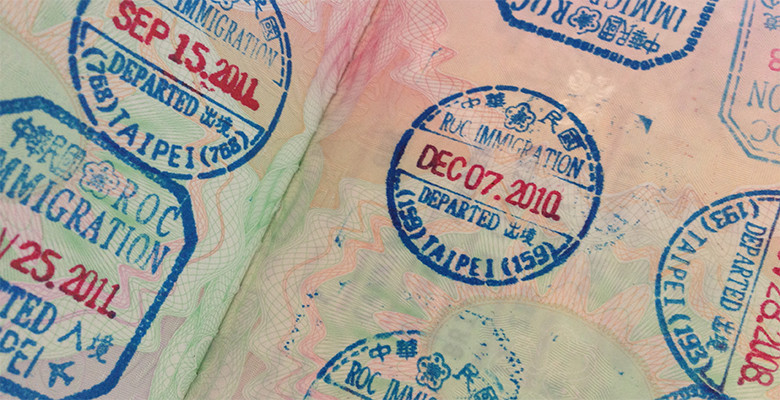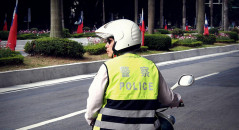
Most Westerners can enter Taiwan visa-free for short visits; if you are working or studying you will need a resident visa
Passport holders from most Western countries including the US may enter Taiwan without a visa as long as the holder’s passport is valid for at least six months beyond the date of entry into Taiwan, and the passport holder has a confirmed return or onward air ticket. The traveller must also have no criminal record and have already met any other visa requirements for the next destination, if applicable. For Americans, if the holder’s passport is valid for less than six months from the date of entry into Taiwan, you may apply for a landing visa that will expire in thirty days or when the passport expires, whichever comes first. These landing visas are not cheap at NT$5,600, so it’s best to renew your passport before you leave for Taiwan. Applications for this landing visa can only be made at Taiwan Taoyuan International Airport and Kaohsiung International Airport. Extensions are not allowed. Travellers to Taiwan may also apply for a Taiwan visa prior to arrival in Taiwan. For fee information and requirements, check Taiwan’s Bureau of Consular Affairs website. Americans can also find information at the American Institute in Taiwan’s website.
Citizens of the following countries do not require a visa to visit Taiwan for less than 90 days, which starts the day after arrival: Austria, Belgium, Bulgaria, Canada, Cyprus, Czech Republic, Denmark, Estonia, Finland, France, Germany, Greece, Hungary, Iceland, Ireland, Israel, Italy, Japan, Latvia, Liechtenstein, Lithuania, Luxembourg, Malta, Monaco, Netherlands, New Zealand, Norway, Poland, Portugal, Romania, Spain, Slovakia, Slovenia, Sweden, Switzerland, the United Kingdom (British citizens), the United States, and Vatican City. An extension for this type of visa is not available. For the sake of reciprocity, British and Canadian citizens may apply to extend the stay from 90 days to 180 days, though you will require what the immigration authorities deem a “legitimate reason”.
Citizens of the following countries do not require a visa to visit Taiwan for less than 30 days: Australia, Malaysia, Singapore, and South Korea.
Overstaying your Visa
Overstaying your visa in Taiwan is viewed very negatively by the authorities. If the overstay is short, you may just be asked to pay a fine of a few thousand Taiwan dollars and be barred from re-entering the country visa-free for a year (you can still re-enter with a valid visa). If your overstay is longer (over thirty days), you will be fined, deported, and banned from re-entering the country at all for a year or a number of years. In recent times some foreign nationals with lengthy overstays have also been detained while their case is processed. To avoid these consequences, it is important to renew your visa in a timely fashion. If you are forced into an overstay by circumstances outside your control (serious illness, for example), then you can contact the National Immigration Authority to let them know your reason. If they are satisfied that you have grounds, they may extend your visa until the extenuating circumstances have been resolved.
Arrival
The vast majority of travellers to Taiwan will arrive at Taiwan Taoyuan International Airport (TPE) in Dayuan, 50km (31 miles) west of Taipei. Kaohsiung and Taichung also offer limited international flights. Upon arrival, travellers entering the country are screened with heat-detecting scanners in order to identify flu-like symptoms, such as fever. Passengers found to have such symptoms will be sent to hospital for further tests. Buses connect TPE with Taipei Main Station in central Taipei and are inexpensive and easy to use. Look for “Express Bus” and “Bus Stop” signs in the terminals. Passengers may also take a bus to the High-Speed Rail (HSR) station in Taoyuan, where you can buy a ticket to Taipei or to many other major cities, most of which are southwest of Taipei (see Transportation). A dedicated Airport Extension line of the Taipei MRT is scheduled to open in 2015. Air and bus terminals in major cities have extensive signs in English as well as English-speaking staff.
Obtaining Residency
Foreign passport holders may stay in the Republic of China for more than six months to join family, to study, to work, to invest, to do missionary work, to conduct official duties, to participate in international exchange programs, or to engage in other activities approved by the Ministry of Foreign Affairs or other relevant central-government agencies. Resident Visa holders are required to apply for the Alien Resident Certificate (ARC) and Re-entry Permit at local service centres of the National Immigration Agency within 30 days starting from the day after their arrival. They may stay in the ROC as long as the ARC remains valid. If foreign nationals who have entered the ROC with Visitor Visas are subsequently legally employed in the ROC or married to an ROC citizen, they may make the necessary change from their Visitor Visa into a Resident Visa in the country directly.
Image in the public domain
Work Permits
Most western foreign nationals employed in Taiwan work in either education or information technology. The majority of native English speakers are English teachers, education consultants, technical writers and editors, engineers, computer programmers, journalists, or translators. There are other employment opportunities for foreigners in Taiwan, but these are scarce. Aside from manual labor, the Taiwanese government generally only allows foreigners to undertake work that cannot be done by the local labor force.
To legally work in Taiwan, you must have both a work permit and an ARC (see above). Exceptions apply for those married to a local or with permanent residency (see below). After a foreign national is hired, the employer initiates the process of obtaining a work permit. Since securing such a document can be difficult and time-consuming, many people relocating to Taiwan find it beneficial to find employment before departing their home country. This can also be a difficult endeavour, depending on the industry. There are several online resources for finding employment in Taiwan (see Appendix), but be careful of accepting employment. Foreign nationals are often recruited from abroad but still find difficulties getting a work permit and ARC from the employer who offered them a position.
So whether you come to Taiwan with or without a job, make sure you have enough money (at least a few thousand US dollars) to pay for fees, extensions, or perhaps even a “visa run” to Hong Kong or Okinawa while you wait for your ARC and work permit to be processed. If your employment is terminated for any reason, your employer is required to report this to the authorities. The termination of your employment has to be processed by the authorities before you can apply to work for someone else.




